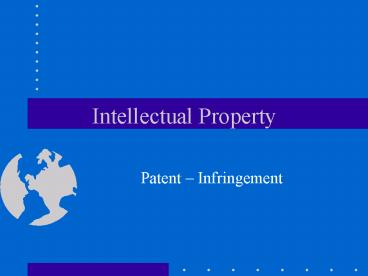Intellectual Property - PowerPoint PPT Presentation
1 / 16
Title:
Intellectual Property
Description:
Intellectual Property Patent Infringement Infringement Literal Infringement The Doctrine of Equivalents 35 U.S.C. 271 (a) Except as otherwise provided in ... – PowerPoint PPT presentation
Number of Views:624
Avg rating:3.0/5.0
Title: Intellectual Property
1
Intellectual Property
- Patent Infringement
2
Infringement
- Literal Infringement
- The Doctrine of Equivalents
- 35 U.S.C. 271
- (a) Except as otherwise provided in this title,
whoever without authority makes, uses, offers to
sell, or sells any patented invention, within the
United States or imports into the United States
any patented invention during the term of the
patent therefor, infringes the patent.
3
Literal Infringement
- Basic rules of literal infringement
- All elements of the claim must be (identically)
present in the accused device - Additional elements in the accused device are
(generally) not relevant to infringement
4
Literal Infringement
- For next slide, consider
- What is the key claim element?
- What does the accused device have instead?
- Why does the court find no infringement as a
matter of law? - How might Plaintiff have drafted the claim to
cover the Supersoaker?
5
Larami v. Amron, (ED Pa 1993)
SuperSoaker 200
129 Patent
Claim 1 a toy comprising an elongated housing
case having a chamber therein for a liquid
tank, a pump including a piston having an
exposed rod piston rod facilitating manual
operation for building up an appreciable amount
of pressure in said chamber for ejecting a stream
of liquid therefrom
6
Doctrine of Equivalents
- Test
- Substantially same function, way, result
- Insubstantial differences
- Allows elements in an accused device to be
substantially equivalent and still be present
for purposes of infringement
7
Doctrine of Equivalents
- Warner-Jenkinson v Hilton Davis (1997)
- - key limitation a pH of approximately 6.0 to
9.0 - - accused process pH of 5.0
- The court reaffirms the DOE, though it notes an
important limit on the doctrine prosecution
history estoppel
8
Festo v. Shoketsu (2002)
- Two issues
- What kinds of amendments trigger estoppel?
- Does estoppel apply to all equivalents based on
the amendment?
9
Festo (2002)
- The Federal Circuit rule amendment no
equivalents for that element - The Supreme Court presumption that an
amendment no equivalents for that element.
Exceptions - Only give up protection for those things that
were foreseeable by those skilled in art - Rationale for the amendment is unrelated to the
equivalent in question
10
Contributory Infringement
- Elements
- (1) Sale of a product
- (2) Material part of patented invention/process
- (3) Knowledge
- (4) Specially made or adapted for infr. use
- (5) Not a staple article of commerce
- (6) No substantial non-infringing use
11
Defenses
- Defenses to infringement action
- Experimental Use
- Inequitable Conduct (Fraud) Such conduct may
consist of omissions or material
misrepresentations during the patent application
process. - Patent Misuse Patent owner has abused his
position to exploit a patent improperly.
12
Patent Misuse
- Types of activity implicating patent misuse
- Extension beyond patent term may try to require
licensee to pay license fees after expiration of
patent (impermissible) - Tying or conditioning the sale of a patented item
to the sale of another staple article
(impermissible) - Tying to non-staple article i.e. article has no
commercial use except in connection with the
patented invention or process (permissible)
13
Patent Law - Remedies
- Injunctions
- Preliminary
- Reasonable probability of success
- Irreparable harm if no injunction (presumed)
- Possibility of harm to third parties
- Public interest
- Permanent
14
Patent Law - Remedies
- Damages
- Lost Profits
- Demand for patented product
- Absence of noninfringing substitutes
- Capability to meet demand
- Profits that would have been made
- Reasonable Royalty
15
International Patent Law
- Governed by each countrys domestic patent laws
- Major differences
- Most have first to file systems
- No one-year grace period after public use, ...
16
Treaties
- Paris Convention
- Once file in a member country, get priority date
- Have one year to file in other country
- Shielded from consequences of publication, etc.
- Patent Cooperation Treaty
- File separate document with domestic agency
- Gives additional 20 months to file
- Up to 30 months if file earlier































